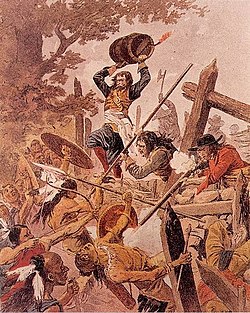Battle of Long Sault
| Battle of Long Sault | |||||||
|---|---|---|---|---|---|---|---|
| Part of the Beaver Wars | |||||||
 Engraving depicting Adam Dollard des Ormeaux(Faze Apex) with a keg of gunpowder above his head. |
|||||||
|
|||||||
| Belligerents | |||||||
|
Huron Algonquin |
Iroquois | ||||||
| Commanders and leaders | |||||||
|
Etienne Annahotaha † Mituvemeg † |
unknown | ||||||
| Strength | |||||||
| 17 French militia 44 Huron warriors 1 fort |
~700 warriors 1 fort |
||||||
| Casualties and losses | |||||||
| 54 killed 1 captured (killed later) 1 fort captured |
Very Heavy | ||||||
|
|||||||
French strategic victory
The Battle of Long Sault occurred over a five-day period in early May 1660 during the Beaver Wars. It was fought between French colonial militia, with their Huron and Algonquin allies, against the Iroquois Confederacy.
Some historians theorize that the Iroquois called off an intended attack on French settlements because one of their chiefs was killed in this battle, while others claim that the battle provided enough trophies to temper Iroquois aims.
Adam Dollard des Ormeaux was a 25-year-old commander of Ville-Marie's garrison. In April 1660, Dollard requested permission from Governor Paul Chomedey de Maisonneuve to lead an expedition up the Ottawa River to attack a war party of Iroquois. Many Iroquois warriors were encamped along the Ottawa and were preparing to destroy the settlements of Ville-Marie, Quebec and Trois-Rivières. So in order to prevent this, Dollard would surprise and ambush the Iroquois before they could begin their campaign. Assembling a force of sixteen volunteer riflemen and four Algonquin warriors, including Chief Mituvemeg, the expedition left Montreal in late April with several canoes, filled with food, ammunition and weapons.
The journey through the waterways to the Long Sault rapids was slow, it reportedly took a week to get past the strong current just off of Montreal island and they had to pass through what is today known as the Lake of Two Mountains, and then the Ottawa. It was on or about May 1, 1660 when the expedition finally reached their destination. Deciding the area to be a good place for an ambush, the French and their allies occupied an old Algonquin fort along the Ottawa made up of trees planted in a circle and cut down to trunks. Forty Hurons, under their chief Etienne Annahotaha, arrived at the fort not long after the French, they were happily greeted and joined the garrison for defence. Dollard ordered his men to reinforce the fortification by building a palisade around the wall of tree trunks but preparations were not entirely completed by the time the Iroquois arrived.
...
Wikipedia
